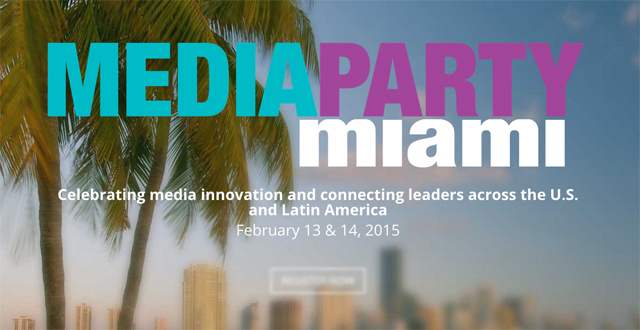
Media Party Miami: Serious fun connecting people with new tools and each other to better serve journalism
The two-day Media Party Miami, celebrated Feb.13-14 in South Florida, was part showcase, part new technologies crash course. It gathered journalists, hackers, academics and students for a day of panels and presentations and a day of hands-on learning, addressing time-honored journalistic values while reframing them with innovation and the new tools to pursue them.
It was a fascinating exercise.
It’s not often that in the span of a day, participants at a conference are regaled with references to soccer star Diego Maradona’s historic 1986 World Cup goal (used as an example and metaphor for drawing a straight line to one’s objectives) but also a demonstration of visualization tools for reporting on the often unholy connections between money and politics (Poderopedia, a Knight News Challenge winner). Or that there might be a team presentation in costumes, as cartoons come to life, offering at one point a powerful interactive piece on street harassment of women in Mexico; or a talk about an ingenious hacker-created Water Quality Sensor for reporting on Amazonian water.
It’s even rarer that this would be followed by a day of hands-on learning, in which, organized in ever-changing groups, participants gathered around big tables or turned small offices at The LAB Miami into classrooms to share new tools and skills, ranging from a clinic on social media and beginner website building to interactive story planning.
Modeled after Media Party Buenos Aires, which celebrated its third edition in August, Media Party Miami was presented by Florida International University’s School of Journalism & Mass Communication in partnership with Hacks/Hackers Miami, Knight Foundation, and the International Center for Journalists. It brought together hackers and journalists, from both traditional and new media, from the United States and Latin America.
It included participants such as Chilean journalist Miguel Paz, founder and CEO of Poderopedia, and Brazil-based data journalist Gustavo Faleiros, who launched InfoAmazonia.org, both Knight International Journalism Fellows; Mariano Blejman, founder of HackLabs, Media Factory and Media Party Buenos Aires and also a recipient of a Knight International Fellowship; Trei Brundrett, chief product officer of Vox Media; Marcus Brauchli, of North Base Media, an investment firm focused on journalism, and former executive editor of The Washington Post; Mindy Marqués González, executive editor of the Miami Herald; and Howard Saltz, editor of the Sun-Sentinel.
The opening day activities took place at Kovens Conference Center at FIU’s Biscayne Bay Campus. On Saturday, Media Party Miami moved to The LAB Miami, a collaborative workspace in the Wynwood Arts District.
The goal of Media Party Miami was “skill-building, cross-pollination and transnational bridge-building across the hemisphere.” For Mercedes Reina, co-founder of the 2-year-old Argentine site elmeme.me and one of the presenters at Friday’s event, it succeeded in spades.
“I attended Media Party Buenos Aires. I knew the format. But still, it was much richer than what I expected, especially because of the diversity and the level of innovation. It’s been mind-blowing,” she said, underscoring the comment in English before turning back to Spanish. “ The panels and presentations were extremely interesting. What the guys at Fusion showed was marvelous, for example. I come from advertising, and I was looking at their approach like an ad agency telling stories, using those tools, and I saw it as something very innovative. The way of connecting with millennials is to tell stories with interactive tools.”
Andrew Cheung, data analyst at Seattle-based Tableau, was part of Friday’s media fair and on Saturday led workshops on Tableau Public, a free public version of the company’s software for data visualization.
“The overarching mission at Tableau is to increase data literacy,” he said. “We feel very strongly that people should have the tools to investigate, analyze and share their insights from data sets they are interested in. We realized that there wasn´t much out there for the public. What was there was not easy, was not fast … so we decided to release a public version.”
His participation at Media Party Miami was part of a trip that included training stops at various Florida newspapers and TV stations, including media in Naples, Tampa and Sarasota.
What made Media Party Miami “very good,” he says, was that “there were a lot of technologists, a lot of startup people, a lot of journalists, and also students and it was very interesting to see these different groups come together and learn about new tools to further their missions.”
Fernando González is a South Florida-based arts and culture writer.
Recent Content
-
Journalismarticle ·
-
Journalismarticle ·
-
Journalismarticle ·


